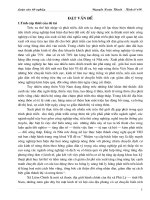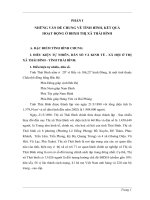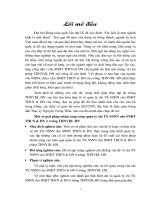Governing TX CH08
Bạn đang xem bản rút gọn của tài liệu. Xem và tải ngay bản đầy đủ của tài liệu tại đây (1.75 MB, 47 trang )
Chapter 8
The Texas
Executive Branch
The Texas Executive Branch
The Governor
• Texas governor position is weak by design
– 1876 Constitution (currently in place) reaction to overly powerful governor
during Reconstruction
• Governor is one member of plural executive
– Multiple elected offices independent of governor
• Unique to Texas, most state governors appoint and
remove these executive positions (that Texans elect)
– Important functions outside governor’s authority
• Budget most notably
The Governor
• To be successful, the governor must:
– Use appointments well
– Willing to veto, but also to negotiate
• Win support for policy agenda from legislators, interest groups, and other vested
parties
– Convince public to adopt vision for state
– Since governors have limited power, it becomes more important to be
popular among voters.
The Governor
• Formal powers of Texas governor
– Call special sessions of the legislature
– Pardon criminals
– Permit fugitives to be extradited
– Appoint state board and commission members
– Veto acts of the legislature
– Give the State of the State address
– Declare martial law
The Governor
• Informal powers of Texas governor
– Biggest power is the power to persuade
– Address the legislature
– Set the agenda for state government
• Cooperation/influence with legislature, agencies,
boards/commissions
– Media covers governor statements and politics
– By far, the most visible state government official
The Governor
• Formal requirements to run
– Thirty years of age
– U.S. citizen
– Resided in Texas for the prior five years
• Informal requirements (viable candidates)
– Strong name recognition
– Prior elected experience
– Successful at fund-raising for campaign and party
– Support from national party
Governors of Texas and Their
Terms of Office since 1874
Campaigns
• Campaigns usually start election year January
• Party primaries held in March
• General elections in November
– Follow the national calendar
• Currently, GOP primaries more consequential than general election for statewide
offices
• Candidates must fund-raise and make the rounds before then.
Campaigns
• State size makes governor campaigns expensive for two reasons:
• Travel distances to fund-raising and events
– Rallies, editorial board meetings, debates
• Travel costs add up (air, gas, cars, hotel, meals,
mobile tech)
• 20 different advertising media markets
– Television and radio ads run by geographic region
•Even in online ad era, most money is spent on TV ads
Campaigns: Texas Media Markets
1. Abilene-Sweetwater
2. Amarillo
3. Austin
4. Beaumont-Port Arthur
5. Corpus Christi
6. Dallas–Fort Worth
7. El Paso
8. Houston
9. Laredo
10. Lubbock
11. Odessa-Midland
12. Rio Grande Valley
13. San Angelo
14. San Antonio
15. Sherman-Ada
16. Shreveport
17. Tyler-Longview
18. Victoria
19. Waco-Temple-Bryan
20. Wichita Falls & Lawton
WHO ARE TEXANS?
2010 Election Results, by County
Margin of victory
Dallas
> 30%
Fort Worth
20 – 29%
10 – 19%
0.1 – 9%
Rick Perry (R)
0.1 – 9%
10 – 19%
20 – 29%
> 30%
Bill White (D)
Houston
San Antonio
SOURCE: Texas Secretary of State
Austin
WHO ARE TEXANS?
Vote Share
= Rick Perry
= Bill White
Urban
46%
52%
Suburban
62%
35%
Rural & Small City
63%
34%
SOURCE: Texas Secretary of State
Governor Impeachment Process
• State constitution does not specify reasons for impeachment
• Majority of Texas House must vote to impeach
• Trial held by state Senate
• Texas Supreme Court chief justice presides
• Two-thirds of state senators present must vote to convict
Succession
• Lieutenant governor becomes governor if governor resigns, dies, or impeached
– 1999 Gov. George W. Bush resigned to run for the presidency, Lt. Governor
Perry became governor
• Lt. governor becomes acting governor when governor is out of state or
incapacitated
Compensation
•
•
•
•
•
Annual salary $115,345
Governor’s mansion
State limousine
Use state-owned aircraf
Personal staff
Governor’s Staff
• About 250 staffers
– Most are responsible for policy work.
• Topical experts, legislative lobbying
– Some are on the political side.
• Schedulers, press secretaries
– Not allowed to campaign; just like any other
office
– State never pays for campaign events or work
Executive Powers of the Governor
• Significant appointment power
• In four-year term, governors make about 3,000 appointments
• Approximately 200 boards, commissions, and agencies oversee important state
functions
– Ex: University regents, Public Utility Commission
Executive Powers of the Governor
Executive Powers of the Governor
• Appointees must be approved by the Senate.
– Take office immediately afer governor appoints
• Thus, in practice, Senate rejects more than it ratifies.
• Senatorial courtesy
– Senator from the appointee’s district must approve of the appointment.
Budget Power
• The governor has a line-item veto.
– Yet cannot impound or transfer funds
– Once money has been appropriated by the legislature, it must be spent.
• Governor has little authority over budgetary process other than the ability to
veto.
– Budgetary duties belong to others in the plural executive and legislature.
Military Power
• Governor is commander in chief of Texas National Guard
– Unless under the president’s command
• Wars and other crises, presidents call upon National
Guard units
• Can declare martial law
• Has been employed under extremely devastating
natural disasters (hurricanes) and riots
– Not used in over 70 years
Executive Powers of the Governor
Legislative Powers of the Governor
• Message power
– State of the State address
• Outlines priorities for the next two years
• Tries to set agenda and outline a budget
– Media attention to governor speeches and events
• Governors also lobby
– International, national, and state policy makers
• Personally or via staffers
• Advance policy agenda articulated during campaign
Legislative Powers of the Governor
• Veto power
– Post-adjournment veto (“strong veto”)
• Veto afer legislature ends session, preventing
override
– Line-item veto
• Gov. can veto specific elements of appropriations
bills.
– Use depends on governor, legislature partisanship
• When governor and legislature majority are same party,
fewer policy disagreements, hence fewer vetoes.









